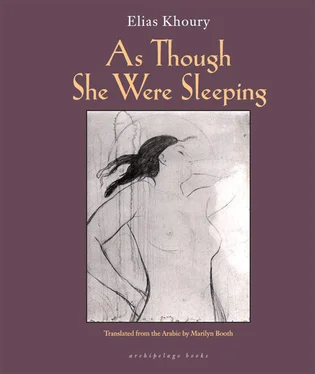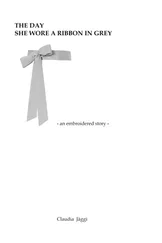That morning Mansour came back at noon to say that they had to go to Jaffa immediately. There was bad news. She did not ask what the news was. She dressed and said she was ready. He asked her to pack their suitcase because they would be staying for about a week, and his brother. . and Mansour began to cry, his flooding tears tinting his face darkly. Ever since that moment, this new dark color had not left the man’s face. Musa’s face disappeared. Milia didn’t know what had happened to the resemblance between the two men that had stayed resolutely in her memory. Mansour became a Jaffawi, his skin dark and his gaze coming through the glinting eyes of his brother, as he worked to conceal his weeping behind loud and prolonged yawns.
She smelled the fragrance of oranges. This was not Beirut’s particular aroma, though, that blend of seductively swaying pines (and the perfume of pine nuts) with acacia blossoms. Jaffa was another story: the scent of lemon trees, of spacious houses, of fear. When she visited Jaffa for the first time — a month after her wedding — she told Mansour she would never go there again because she saw fear carved into the thick fragrance of orange trees. She was no longer fond of oranges, she said. The smell of oranges would send her into a fear she could not pinpoint, but it spread throughout her body all the way to her toes and fingertips and paralyzed her. She could not face the smell of oranges, she said. She must cover her face.
It’s the cravings of pregnancy, or it’s morning sickness, said her mother-in-law. Just be patient.
No, that was not it. This was a feeling that crept into the bones and stayed there, there was no antidote for it. All she wanted was to cover her face, to put on the Jaffa niqab that she saw draped over the faces of the city’s women.
And now here she was, in the City of Perfume as Jaffa people called it. It was so sweet smelling, they claimed, because the scent of bitter orange permeated the air. They did not know that this perfume skirting the heavens would become the city’s shroud, the emblem of its death.
The woman who arrived from Nazareth carrying a seven-month-old baby in her belly would find herself lashed by a profound sorrow that bore no relation to the grief that spread across Ajami and pervaded the Hourani household after the tragic loss of their eldest son. The woman’s despair swelled because she saw what no one else could see. In the scent of Jaffa she smelled the sign of its demise. It was not because she had seen Amin dead. It was because of the scent, which had begun to turn yellow on people’s faces, transforming mourners into phantoms. A crowd came to the home to mourn the martyr who had left behind two children, the eldest seven years of age and the second one only five years old, and a young wife from near Beit Sahour, and had deposited a hoarse scream of revenge in the throats of the mourning crowd which turned Mansour utterly speechless. Amin’s killing took place as a fierce wave of explosions sliced through Jaffa in 1947, and it seemed that the young man’s talkative ways had led him to his death. Mansour was convinced that his brother died from telling people too much. A person who puts the shot into English guns and figures out how to turn ordinary automobiles into armored cars so that the Palestinians would possess some sort of heavy weapon with which to square off against the superior Zionist matériel does not talk about it. But Amin was a voluble man who enjoyed making a spectacle of himself, and this was the main reason behind the brothers’ rift and Mansour’s flight to Nazareth. Well, no. . the chief cause was their mother. The mother was not only partial to her eldest son but indeed completely wrapped up in her fondness for him. Since the father’s death she had treated her eldest as though she were his wife. She asked him to come and sleep in her room, in the dear departed’s bed, because she was afraid to sleep alone.
Amin was active in the ranks of the city’s Orthodox lay association and was a member of the League of National Action formed by the Arab Higher Committee. In the Grand Mufti he saw a savior, and he dreamed of traveling to Iraq to aid the revolution mounted there by Rashid Ali el-Gaylani against the English. It was whispered that he had undergone training in the use of weapons and that he kept an English gun at home.
His mother did not love him, Mansour said. He did not know why. Perhaps it was because he looked like her. Since his early childhood he knew the story firsthand and heard it repeatedly from his mother: she had expected God to give her a daughter. When a second son was bestowed upon her she treated her son as though he were a little girl. She grew his hair long and braided it, and added a feminine ending to his name. Amin played along, treating his brother in the same way. He even tried to carry the game into their school and Mansour found himself hearing his classmates calling him Mansoura as if he were truly a girl. He responded aggressively, acting out like any feisty boy and thus laying himself open to beatings at the hands of classmates on a daily basis. He often came home covered in blood, a taste he knew very well, he told Milia. He had gone through adolescence drinking the blood that poured from his nose; and when he grew a bit older he sensed the oddness of his family, run by an ironfisted mother who showed no mercy.
I am nothing like her, said Mansour. She is an overbearing, dominating woman who thinks of nothing but amassing money and property. So I left her with everything. I don’t want to go back to Jaffa or to the smell of blood that runs across the city. Yes, resistance is a duty, but I just don’t know. .
Seeing Mansour change before her eyes, Milia remembered snatches of this family story. Putting on his brother’s face, he would declare his intention to return to Jaffa. On their very first day back from Jaffa, after the funeral, he spoke to her of returning there to live. She replied that she could not do it, not right now. She must have the baby first. And she could not give birth in that city.
But my mother is there, he said. She will help you.
No, I don’t want your mother. And my mother isn’t well enough to come here. But I’m staying. You go if you want to.
He said he had considered sending her to Lebanon but it was not an easy matter because the roads were not secure. He said he was ready to agree to what she wanted on condition that they move to Jaffa a mere week after the baby’s arrival. He would have to sell off his Nazareth shop and his merchandise now, he said, because he must start spending most of his time in Jaffa, to put the foundry in order and resume his original line of work.
Milia’s nights filled now with oranges that looked like bombs, the color red everywhere, covering faces and objects. Mansour was away for three days of every week and Milia began to spend her nights alone. The man was no longer able to pierce the veil of solitude behind which this woman lived. He no longer came near her at night. The poems vanished. Speech became a repetition of speech. Mansour became another man and Milia, another woman. Her dreams took on other shapes, new ones. Everything she saw was floundering, or drowning.
Milia’s nights were long and sorrowful. There in the hollows of her darkness she saw the short men with blue eyes gathering around the bier, hoisting it onto their shoulders, and marching to the seaside grave. On a hill facing the sea where the waves swelled high, the coffin dipped precariously over hands attempting to hold on to it. The waves came up, the sea roared near, and like a blue animal with an unending body it leapt atop the rise and swept over it, pulling the coffin outward as it receded, and swallowing the men.
The little girl stands next to Mansour, terrified. She does not know how to escape the waves. She grips his hand but the hand slides out of hers. She runs but the waves gallop after her. She climbs and the waves mount behind her. She falls and finds herself in the water. All of them have disappeared. The waves have swallowed everyone and have taken them to a place she does not know and cannot find. The waves stalk people. The little girl is alone, her hands slipping, water all but swallowing her, water and her tears. The water slithers into her lungs; her chest swells and there is no air. Water and salt. Her throat is salt, her lips are cracked, her hand jerks back and forth along the horizon. The coffin lid is open. A blond man is holding his hands out to her. Where did this French officer come from? He was standing alone in the street at night as an autumn breeze swished raindrops through the sky. The woman who always wears black awaits him in the garden. But the man does not move. He stands at a distance as if spying on her, and then he comes forward, stumbling as if he is slightly dizzy. His body juts forward. He falls. Blood spins from holes high on his back. Blood fills up all the spaces. The street is flooded. Blood. The coffin floats on the red-black flow.
Читать дальше












